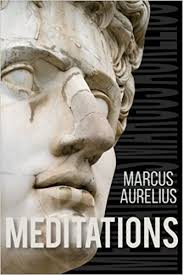Meditations Page #23
Meditations is a series of personal writings by Marcus Aurelius, Roman Emperor from 161 to 180 AD, recording his private notes to himself and ideas on Stoic philosophy. Marcus Aurelius wrote the 12 books of the Meditations in Koine Greek as a source for his own guidance and self-improvement.
XXI. I for my part will do what belongs unto me; as for other things, whether things unsensible or things irrational; or if rational, yet deceived and ignorant of the true way, they shall not trouble or distract me. For as for those creatures which are not endued with reason and all other things and-matters of the world whatsoever I freely, and generously, as one endued with reason, of things that have none, make use of them. And as for men, towards them as naturally partakers of the same reason, my care is to carry myself sociably. But whatsoever it is that thou art about, remember to call upon the Gods. And as for the time how long thou shalt live to do these things, let it be altogether indifferent unto thee, for even three such hours are sufficient. XXII. Alexander of Macedon, and he that dressed his mules, when once dead both came to one. For either they were both resumed into those original rational essences from whence all things in the world are propagated; or both after one fashion were scattered into atoms. XXIII Consider how many different things, whether they concern our bodies, or our souls, in a moment of time come to pass in every one of us, and so thou wilt not wonder if many more things or rather all things that are done, can at one time subsist, and coexist in that both one and general, which we call the world. XXIV. if any should put this question unto thee, how this word Antoninus is written, wouldst thou not presently fix thine intention upon it, and utter out in order every letter of it? And if any shall begin to gainsay thee, and quarrel with thee about it; wilt thou quarrel with him again, or rather go on meekly as thou hast begun, until thou hast numbered out every letter? Here then likewise remember, that every duty that belongs unto a man doth consist of some certain letters or numbers as it were, to which without any noise or tumult keeping thyself thou must orderly proceed to thy proposed end, forbearing to quarrel with him that would quarrel and fall out with thee. XXV. Is it not a cruel thing to forbid men to affect those things, which they conceive to agree best with their own natures, and to tend most to their own proper good and behoof? But thou after a sort deniest them this liberty, as often as thou art angry with them for their sins. For surely they are led unto those sins whatsoever they be, as to their proper good and commodity. But it is not so (thou wilt object perchance). Thou therefore teach them better, and make it appear unto them: but be not thou angry with them. XXVI. Death is a cessation from the impression of the senses, the tyranny of the passions, the errors of the mind, and the servitude of the body. XXVII. If in this kind of life thy body be able to hold out, it is a shame that thy soul should faint first, and give over, take heed, lest of a philosopher thou become a mere Caesar in time, and receive a new tincture from the court. For it may happen if thou dost not take heed. Keep thyself therefore, truly simple, good, sincere, grave, free from all ostentation, a lover of that which is just, religious, kind, tender-hearted, strong and vigorous to undergo anything that becomes thee. Endeavour to continue such, as philosophy (hadst thou wholly and constantly applied thyself unto it) would have made, and secured thee. Worship the Gods, procure the welfare of men, this life is short. Charitable actions, and a holy disposition, is the only fruit of this earthly life. XXVIII. Do all things as becometh the disciple of Antoninus Pius. Remember his resolute constancy in things that were done by him according to reason, his equability in all things, his sanctity; the cheerfulness of his countenance, his sweetness, and how free he was from all vainglory; how careful to come to the true and exact knowledge of matters in hand, and how he would by no means give over till he did fully, and plainly understand the whole state of the business; and how patiently, and without any contestation he would bear with them, that did unjustly condemn him: how he would never be over-hasty in anything, nor give ear to slanders and false accusations, but examine and observe with best diligence the several actions and dispositions of men. Again, how he was no backbiter, nor easily frightened, nor suspicious, and in his language free from all affectation and curiosity: and how easily he would content himself with few things, as lodging, bedding, clothing, and ordinary nourishment, and attendance. How able to endure labour, how patient; able through his spare diet to continue from morning to evening without any necessity of withdrawing before his accustomed hours to the necessities of nature: his uniformity and constancy in matter of friendship. How he would bear with them that with all boldness and liberty opposed his opinions; and even rejoice if any man could better advise him: and lastly, how religious he was without superstition. All these things of him remember, that whensoever thy last hour shall come upon thee, it may find thee, as it did him, ready for it in the possession of a good conscience. XXIX. Stir up thy mind, and recall thy wits again from thy natural dreams, and visions, and when thou art perfectly awoken, and canst perceive that they were but dreams that troubled thee, as one newly awakened out of another kind of sleep look upon these worldly things with the same mind as thou didst upon those, that thou sawest in thy sleep. XXX. I consist of body and soul. Unto my body all things are indifferent, for of itself it cannot affect one thing more than another with apprehension of any difference; as for my mind, all things which are not within the verge of her own operation, are indifferent unto her, and for her own operations, those altogether depend of her; neither does she busy herself about any, but those that are present; for as for future and past operations, those also are now at this present indifferent unto her. XXXI. As long as the foot doth that which belongeth unto it to do, and the hand that which belongs unto it, their labour, whatsoever it be, is not unnatural. So a man as long as he doth that which is proper unto a man, his labour cannot be against nature; and if it be not against nature, then neither is it hurtful unto him. But if it were so that happiness did consist in pleasure: how came notorious robbers, impure abominable livers, parricides, and tyrants, in so large a measure to have their part of pleasures? XXXII. Dost thou not see, how even those that profess mechanic arts, though in some respect they be no better than mere idiots, yet they stick close to the course of their trade, neither can they find in their heart to decline from it: and is it not a grievous thing that an architect, or a physician shall respect the course and mysteries of their profession, more than a man the proper course and condition of his own nature, reason, which is common to him and to the Gods?
Translation
Translate and read this book in other languages:
Select another language:
- - Select -
- 简体中文 (Chinese - Simplified)
- 繁體中文 (Chinese - Traditional)
- Español (Spanish)
- Esperanto (Esperanto)
- 日本語 (Japanese)
- Português (Portuguese)
- Deutsch (German)
- العربية (Arabic)
- Français (French)
- Русский (Russian)
- ಕನ್ನಡ (Kannada)
- 한국어 (Korean)
- עברית (Hebrew)
- Gaeilge (Irish)
- Українська (Ukrainian)
- اردو (Urdu)
- Magyar (Hungarian)
- मानक हिन्दी (Hindi)
- Indonesia (Indonesian)
- Italiano (Italian)
- தமிழ் (Tamil)
- Türkçe (Turkish)
- తెలుగు (Telugu)
- ภาษาไทย (Thai)
- Tiếng Việt (Vietnamese)
- Čeština (Czech)
- Polski (Polish)
- Bahasa Indonesia (Indonesian)
- Românește (Romanian)
- Nederlands (Dutch)
- Ελληνικά (Greek)
- Latinum (Latin)
- Svenska (Swedish)
- Dansk (Danish)
- Suomi (Finnish)
- فارسی (Persian)
- ייִדיש (Yiddish)
- հայերեն (Armenian)
- Norsk (Norwegian)
- English (English)
Citation
Use the citation below to add this book to your bibliography:
Style:MLAChicagoAPA
"Meditations Books." Literature.com. STANDS4 LLC, 2025. Web. 25 Feb. 2025. <https://www.literature.com/book/meditations_76>.








Discuss this Meditations book with the community:
Report Comment
We're doing our best to make sure our content is useful, accurate and safe.
If by any chance you spot an inappropriate comment while navigating through our website please use this form to let us know, and we'll take care of it shortly.
Attachment
You need to be logged in to favorite.
Log In